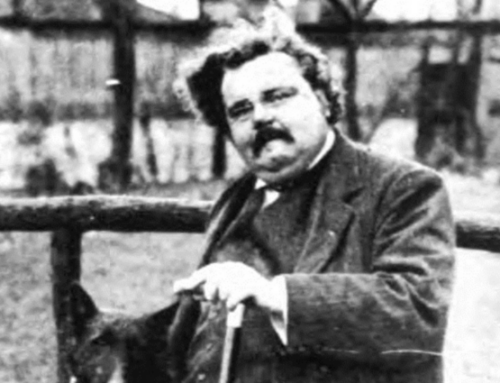 For all those out there wondering, including my first-grade art teacher who never learned how to pronounce it, my surname is actually pronounced with a long rather than short “e.” It’s “DEE-vuhl” and not “Devil.” But the moniker of a demon has been applied to me so often that I have decided to make demon-ade. I present to you a selection of definitions in homage to the great Ambrose Bierce, whose The Devil’s Dictionary set out to reveal the weaknesses of language and thought in the late-nineteenth and early-twentieth centuries. Some will read this Deavel’s Dictionary selection of words and definitions and say: “This isn’t fair! You have not taken the ‘correct’ meaning of the terms below from [insert favorite authority].” Oh, how little you know! Modern dictionary makers have long moved beyond the authoritarian task of prescribing usage and are merely describing how words are used. These definitions show how the words are used, not how they should be.
For all those out there wondering, including my first-grade art teacher who never learned how to pronounce it, my surname is actually pronounced with a long rather than short “e.” It’s “DEE-vuhl” and not “Devil.” But the moniker of a demon has been applied to me so often that I have decided to make demon-ade. I present to you a selection of definitions in homage to the great Ambrose Bierce, whose The Devil’s Dictionary set out to reveal the weaknesses of language and thought in the late-nineteenth and early-twentieth centuries. Some will read this Deavel’s Dictionary selection of words and definitions and say: “This isn’t fair! You have not taken the ‘correct’ meaning of the terms below from [insert favorite authority].” Oh, how little you know! Modern dictionary makers have long moved beyond the authoritarian task of prescribing usage and are merely describing how words are used. These definitions show how the words are used, not how they should be.
America, n. A horrible, racist, sexist, xenophobic, Islamophobic, homophobic hellscape (also known as the United States) that also grinds the poor into the ground as a matter of course. It also unjustly tries to keep out the hundreds of millions of people from around the world who are inexplicably trying to get in legally or illegally, often at great personal cost and danger to their own lives.
Anti-, adj. Against. Well, not literally against. It means to be against other people doing or having the thing you are anti-. “Anti-fascism” is not against black-clad, masked people terrorizing those who do not agree with their group; it is against other black-clad, masked people doing this, as well as anybody not in masks or black who resists the will of the Anti-fascist. “Anti-racism” is similar. It does not mean to cease judgments for or against people because of race, discrimination for or against people because of race, or policies designed to favor or disfavor people on the basis of race. It means making the right judgments, personal discrimination, and policy according to race. Hence, if you believe that white people value “hard work” and “objective, rational linear thinking,” use techniques like planning for the future and delaying gratification to get success, and believe in private property, while non-white people do not, you may well be a racist in a funny hat or work as an anti-racism consultant at the Smithsonian.
Canceled, v. To have had one’s public voice shouted down, one’s career ended, or even one’s personal history stricken from the records for offenses, real or imagined, against current standards. The process of cancellation usually stems from a small group of people on Twitter whose voice is amplified enough to scare corporate leaders and public officials into acting against their better judgments.
Constitution, U.S., n. [1] A document written by rich slave owners that was designed to keep power and privilege in the hands of white men. Because of its origins it does not need to be read or understood to be damned. [2] A charter of ever-expanding personal rights (mostly to do with sex) not based in God, nature, or any anthropology deeper than the songs of Lady Gaga. While it claims a connection with the document from [1] in order to make Supreme Court decisions seem like they’re based in something more than just “What We All Know—or Should” and to identify the supposed rights contained in it (an ever-growing list, hence its usual designation as “living”) as contained in “emanations” from “penumbras” of clauses in that document, its real sacred text comes from Supreme Court Justice Anthony Kennedy, who wrote on a stone tablet named “Casey” that “At the heart of liberty is the right to define one’s own concept of existence, of meaning, of the universe, and of the mystery of human life.” You do you, man! As long as it’s not some weird religious or conservative thing.
Controversial, adj. Any act, speech, or opinion that goes against the conventional wisdom or political correctness.
Courageous, adj. Any act or speech that flatters the conventional wisdom or political correctness.
Defund, v. [1] To take away all funds from a project or agency. When you “defund the police,” you effectively abolish it, paving the way for a summer of love in which lions lay down with lambs and gang members beat their glocks into materials for new iPhones. [2] Because [1] is generally hard to do even with sensible ideas of what to abolish when it comes to government, the more common meaning of “defund” is to skim off money from one program and throw it into a lot of other programs such that the “defunded” program is even worse, but your friends who have college degrees—but neither technical skills nor common sense—can have sweet consulting gigs at the taxpayer expense.
Discredited, adj. Any belief, story, fact, report, document, or person that is not believed by the ruling class. While some people demand evidence or arguments that “discrediting” has occurred, this is not necessary. On the testimony of one reporter at the New York Times or even one person who has uttered the words “Studies show,” you can say with authority, “Sorry, but he/she/that’s been discredited.”
Dogma, n. A belief that is held with unshakable firmness by the wrong sort of people even against evidence to the contrary. Such beliefs held by the right sort of people and those aspiring to be in this group are simply “What Everybody Knows—or Should.”
Equality, n. [1] A state in which one thing is neither inferior nor superior, having no less and no greater worth or importance than the thing to which it is being compared. [2] With reference to people, the term is understood as having exceptions. All people are equal, but some people are more equal than others. Often used with “especially.”
European, adj. A designation of superior intellectual quality so long as the European thing goes along with whatever you were going to do anyway and is intoned in a cool accent. Citing Swedish socialist policies of the 1970s as “European sophistication” is perfectly acceptable while citing Swedish repeals of that failed period shows you simply should not be listened to.
Expert, n. Any person who is properly accredited as one who can tell us “what everyone knows—or should.” Accrediting experts is analogous to the act of discrediting them. While having letters behind one’s name indicating advanced degrees (no matter whether the degree was in something related to the topic at hand or not) is useful, it is not necessary. All it takes to be an expert is to have one of the right people in good standing account you as an expert.
Fascism, n. [1] A state of government by black-clad, masked people of whom you do not approve terrorizing you by demanding lock-step agreement with their views. [2] Pretty much any position, policy, or group found to the right of you on the political spectrum with which you do not agree or for which you cannot formulate an opposing argument.
Federalism, n. A political system that includes both regional governments and a general government together in the ruling of a polity. In the horrible place that is the U.S. (see “America”), this often means that horrible state and local governments sometimes demand freedom from the general (or federal) government’s strictures on gun laws, etc., which is totally bogus. States that refuse to enforce or violate federal immigration, or especially drug laws, are… whoa! Did you know if you stare at the letter Q you can see the universe giving birth to a hockey stick?
Feminism, n. The belief that men and women are equal. Especially women.
Journalism, n. A form of writing or televised reporting in which you determine or ask your editor if you are unsure (if you don’t know, this may be a sign you are Not a Good Fit Here) what pious lesson you should learn from any event (see “Narrative”) and then write an article in which the content is determined according to whether the answers to the questions asked by the extinct species known as “reporters” (see “Reporting”) will reinforce in or convince readers to understand the pious lesson.
Liberal, n. A nearly extinct type of political actor who generally believed in antiquated concepts such as free speech, the rule of law, the consent of the governed, etc. Such a figure has been nearly eliminated from society because he or she rarely takes his own side in a quarrel—at least with progressives.
Liberty, n. Huh? What’s that?
Literally, adv. Denoting that something didn’t actually happen, but that, like, it totally seemed like it, e.g., Dude, making that change to the rate of reimbursement for Medicare is literally killing old people.
Matter, v. [1] To be of intrinsic importance, to have value. [2] More commonly in contemporary political speech, to be useful to one’s political goals, e.g., “Science matters!” (see “Science”) or “[X] lives matter!” Lives and especially deaths of black people, American Indians, cops, or anybody else that does not allow one to advance one’s narrative (see “Narrative”) really do not matter.
Narrative, n. In politics and especially journalism, it is the predetermined story that one is obligated to tell to advance a pious lesson about the world. The narrative determines what facts or voices you are allowed to listen to, report on, or cite in polite company. Any facts that do not comport with the narrative must be smothered.
Nationalism, n. [1] The view that nations are important and a valid kind of political organization. [2] An obviously deluded attachment to one’s own nation as the rightful political authority and a love of that nation despite its flaws. I mean, who are we kidding? They do it so much better in Europe where they have moved beyond nations. No, not Hungary and Poland!
Religion, n. A horrible, bigoted, and irrational set of dogmatic (see “Dogma”) beliefs and institutions that claim to teach transcendent meaning and purpose to human existence derived from “supernatural” beings and also tell people what they can and cannot do in the sack. Don’t think this has to do with Islam or other cool religions, however. As I write this, my horoscope (Aries) tells me “not to let anybody misunderstand [me] about big matters.”
Reporting, n., archaic. The act of writing or telling true stories in which one answers questions such as “who, what, when, where, and why,” no matter whether the answers to those questions help or hurt your narrative (see “narrative”).
Rights, n. Things that you are owed by others. Usually divided into “negative rights,” which are things no one should stop you or even discourage you from doing, and “positive rights,” which are things which others are required to provide you or help you with. Negative rights include pretty much anything you want to do that involves your genitals as long as you have the consent of the people you are doing the thing with, saying words formerly considered naughty, and expressing ugly political views that are politically correct. They do not include refraining from sexual acts that you really want to do even if you know them to be morally wrong, saying words that are now considered naughty—or even quoting them—and expressing political views that are not considered politically correct. Such things are not rights, but an endangerment of the safety of those around you. Positive rights include food, shelter, healthcare, the use of the bathroom at Arby’s even if you didn’t pay for any food, condoms, birth control, and abortions. Guns having nothing to do with either kind of rights.
Safety, n. [1] The condition of never hearing anything that makes you feel uncomfortable because it disagrees with your views. [2] The condition of never failing to hear others echo your views with full-throated enthusiasm. If either definition is not met, you are not safe and are morally permitted to get up a Twitter posse and try to cancel such people.
Science, n. Anything said, written, or tweeted by a person accredited as a scientist that confirms what you already believe—that is, if you’re the right kind of person. While some people demand to see the data and arguments made by scientists, this is not necessary. C’mon, man, are you a [epidemiologist/climate scientist/neurologist/sexologist]? Just shut up. You’re being anti-science.
Silence, n. Silence is an act of violence whereby somebody does not agree with the politically correct view and refuses to say that it is true because he or she does not agree with it. By not stating the view (or not denouncing others who have not stated the view), the person who commits the violence of silence makes other people feel unsafe (see “Safety”).
Socialism, n. A system of government in which the government owns or controls the means of production, everybody eats his or her fill, finds satisfaction and fullness in work, and the People make decisions. Historical places such as the twentieth-century U.S.S.R. and modern Venezuela that are deemed socialist paradises are not to be criticized until they are revealed to have become hells on earth, at which point one is obligated to say that they did not practice “real socialism.”
Speech, n. A form of violence in which people with the wrong views express them, endangering the safety of all (see “Safety”).
Toxic, adj. [1] Any behavior that endangers others (see “Safety”) or causes unnecessary social friction. [2] Particularly in gender discourse, any action or speech by males that upsets females by reminding them that men are on the average larger and stronger than women and can help them. Thus: Look at that man carrying a woman out of the rubble! As if she couldn’t do that herself just because her legs are broken. That’s toxic masculinity!
Violence, n. A form of speech in which people upset about society—for the right reasons, of course—destroy property and attack persons in order to express their anger about a society in which people’s property and persons are allowed to be attacked.
Whataboutism, n. The absurd act of arguing that one’s own side is being held to a standard to which the other side is not held and then saying that one standard has to be the rule for both parties.
Woke, adj. The condition of having been awakened from one’s own slightly reflected-upon views about culture, politics, and race that were mostly derived from figuring out “What Everybody Knows—or Should” in college and adopting the new ones because, hey, I really don’t want to be canceled… or worse.
The Imaginative Conservative applies the principle of appreciation to the discussion of culture and politics—we approach dialogue with magnanimity rather than with mere civility. Will you help us remain a refreshing oasis in the increasingly contentious arena of modern discourse? Please consider donating now.
The featured image is courtesy of Pixabay.







This is brilliant! Thank you!
Well done, David!
Absolutely tremendous. I loved the Devil’s Dictionary, and this one is a kinder and gentler version.
Loved it!